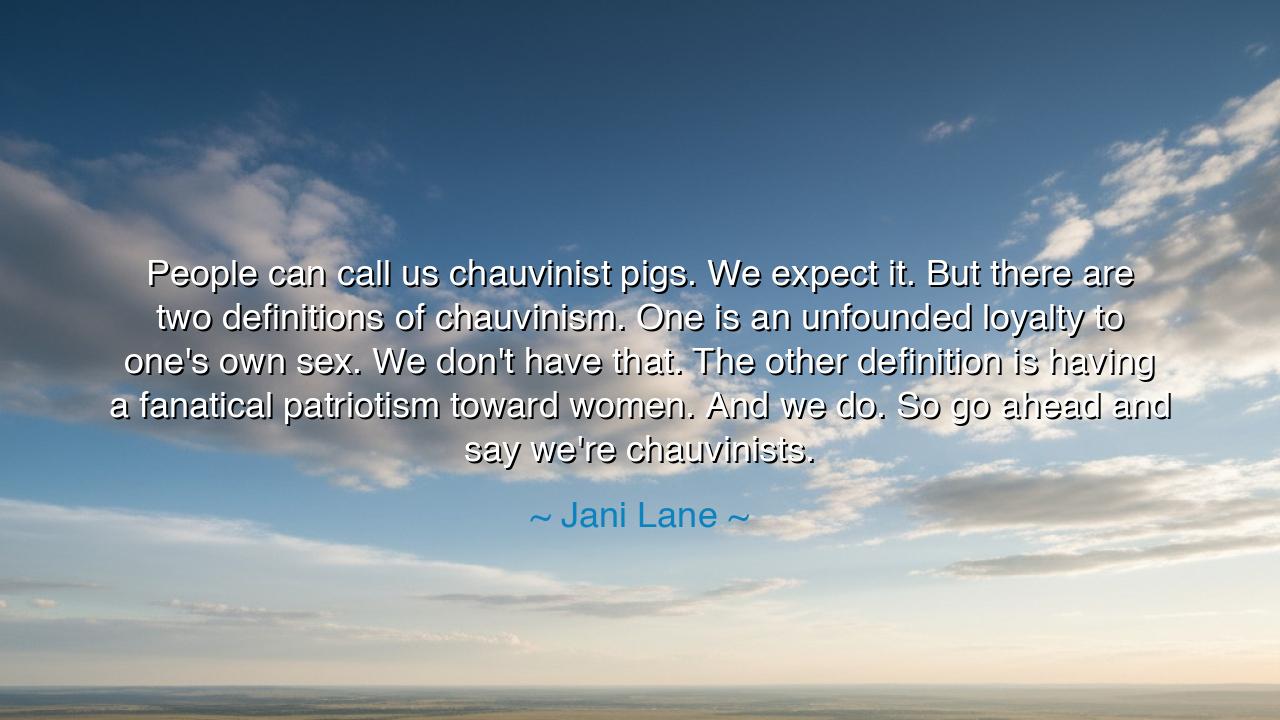
People can call us chauvinist pigs. We expect it. But there are
People can call us chauvinist pigs. We expect it. But there are two definitions of chauvinism. One is an unfounded loyalty to one's own sex. We don't have that. The other definition is having a fanatical patriotism toward women. And we do. So go ahead and say we're chauvinists.






“People can call us chauvinist pigs. We expect it. But there are two definitions of chauvinism. One is an unfounded loyalty to one’s own sex. We don’t have that. The other definition is having a fanatical patriotism toward women. And we do. So go ahead and say we’re chauvinists.” Thus declared Jani Lane, the singer-poet of an age when rock and rebellion were one. His words, wrapped in jest and provocation, carry within them a paradox: the sting of accusation and the embrace of devotion. For he takes a charge meant to wound—chauvinism—and transforms it into a banner of praise for women, turning derision into declaration.
The origin of this saying lies in the cultural battlefield of the late twentieth century, when the word chauvinism had become a weapon hurled against men who exalted themselves at the expense of women. Lane, in the heat of rock’s wild theater, twisted the meaning to reveal something unexpected. If chauvinism could mean blind arrogance, it could also mean boundless loyalty, an almost religious reverence. By this turn of phrase, he claimed not contempt for women, but rather an intense, unashamed admiration—a patriotism toward women, as if they were the nation to which his heart pledged allegiance.
This play of meaning carries echoes of the ancients. Consider the poets of old who exalted their muses, raising women to near-divine stature. Dante, in his devotion to Beatrice, transformed her image into a guiding star through paradise. Petrarch, in his verses to Laura, built an edifice of immortal poetry. These men too could have been accused of obsession, of surrendering too much to admiration. Yet what the world received from their “fanatical patriotism” was beauty that transcended time. Lane, though speaking with the swagger of a rocker, stands in this lineage: a man declaring unapologetic loyalty to the inspiration that women provided his art and his life.
Yet hidden beneath the humor and bravado is a lesson in perception. When one is accused, one may cower or one may redefine. Lane chose the latter, teaching us that words, like swords, may be turned against those who wield them. By embracing the label chauvinist but twisting its meaning, he revealed the power of language to reshape reality. He teaches us that what is meant as insult may be reclaimed as honor, if the heart behind it is sincere.
But let us be cautious: to cloak true arrogance under the guise of reverence would be deceit. The balance between admiration and domination must be carefully held. To practice Lane’s “patriotism toward women” rightly is to honor, not objectify; to uplift, not belittle. History is littered with men who claimed devotion, yet practiced oppression. The measure of loyalty is not in words, but in deeds: respect, equality, and love given freely and without demand.
The lesson for future generations is thus twofold. First, words hold power, and one must learn to wield them as Lane did—with wit, with boldness, with creativity. Second, true reverence for another, whether for women, for friends, or for one’s people, must always be expressed through action. To admire without respect is folly. To declare loyalty without honor is empty. But to live out devotion with integrity—that is greatness.
Practical actions follow: men and women alike should learn to speak with both courage and care, redefining the insults cast upon them into shields of strength. Let your admiration for others not be shallow flattery, but true respect that empowers. And let your “patriotism toward women” or toward any group you claim to honor, be seen in your conduct, your fairness, your willingness to listen, and your steadfast loyalty.
So, let Lane’s defiant words echo not only as rock-and-roll bravado but as a reminder: accusations need not define you, if you have the courage to define yourself. Call it chauvinism if you will, but let it be the kind born of love, reverence, and loyalty—a devotion that uplifts, and a passion that inspires.






AAdministratorAdministrator
Welcome, honored guests. Please leave a comment, we will respond soon